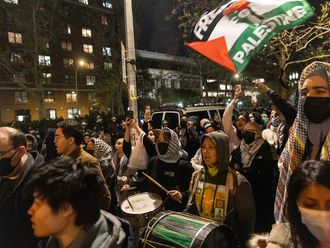It was with a heavy heart that I learned of Nelson Mandela’s death last night. His patience, dignity, and unwavering smile, his moral - and political - triumph over the most brutally oppressive regime was a constant reminder of the human soul’s indomitable drive for justice and freedom.
In 1991, just one year after his release from prison, I was part of a Palestinian delegation that went to meet Nelson Mandela and his then wife, Winnie, when they came to London.
Our purpose was simply to show Mandela our appreciation for his years of struggle, our respect for his endurance, and our joy that the African National Congress (ANC) had prevailed over the apartheid regime.
It was quite overwhelming, and not a little surreal, when South Africa’s resistance hero entered the restaurant in a Mayfair hotel to join us for afternoon tea.I was amazed by how humble and modest Mandela was, and I was charmed by his warmth.It was poignant, too, that he was sitting with us, Palestinians, a people still under the heel of a brutish, cruel and racist regime. He told us that he believed an independent Palestinian state would be established, and “soon”. Sadly that has not yet come to pass. Mandela had long identified the ANC’s struggle with that of the Palestinians and was close to Yasser Arafat. The latter once confided to me that he had secretly helped Oliver Tambo (Mandela’s deputy) receive medical treatment in London during the 1980s. Mandela returned the favour when, as newly elected president, he funded the PLO Embassy in Johannesburg at a time when Arafat’s coffers were empty.
In 1997, having been president for three years, Mandela placed our cause at the top of his agenda and announced to the world: “Our freedom is incomplete without the freedom of the Palestinians.” He told John Pilger that, “Justice for Palestine is the greatest moral issue of our time” and highlighted the similarities between the former apartheid regime in South Africa and that operated by the Israelis.
When Mandela’s Jewish ANC colleague, Denis Goldberg, fled the Afrikaner regime’s clutches after 22 years in prison, he briefly sought refuge in Israel. Traumatised by “the many similarities between the oppression of Blacks in South Africa and that of the Palestinians in Israel”, he stayed just a few months before relocating to London.
Effectively concealed from much of the international community by a combination of Israeli hasbara [media manipulation] and American diplomatic muscle, this equation is now firmly embedded in the South African political vocabulary. The editor-in-chief of the (South African) Sunday Times, Mondli Makhanya, said of a trip to Israel: “NNothing can prepare you for the evil we have seen here…the level of apartheid, the racism and the brutality are worse than the worst period of [South African] apartheid…I do not think the Israelis see the Palestinians as human beings at all.”
Under Mandela’s presidency, Tshwane (Pretoria) completely severed all diplomatic and economic ties with Israel.
This African leader has often trodden where Arab counterparts lacked the courage to venture.
In 1997, when Muammar Gadaffi’s Libya was under strict sanctions and an air embargo, Mandela flew by helicopter to the border town of Ras Adjir, travelling thence by road to visit his “dear brother leader”, Gadaffi, who had always been among his most stalwart supporters.
Most outspoken critic
Mandela also intervened on Lockerbie, urging the UK government to allow two Libyan nationals accused of the Lockerbie bombing to be tried in a neutral country. Amazingly, Mandela had himself been accused of the 1988 bombing by then South African president Pik Botha…despite the fact that he was under house arrest at the time.Mandela was a most outspoken critic of the 2003 invasion of Iraq, stating unequivocally that “all Bush wants is Iraqi oil”. He put in a furious telephone call to number 10 Downing Street in an attempt to dissuade Tony Blair from following the Pentagon’s lead.
Just as Nelson Mandela became the role model for resistance, he produced, too, a new blueprint for statesmanship. How many world leaders have demonstrated such courage, integrity, genuine care for the people and absence of self-interest?
How unlike the many Presidents we have witnessed, laughably clinging to power at any cost, was his quiet announcement that he was stepping down in 1999.
How much we can learn from his political example, too. He showed that resistance and tolerance can walk hand in hand. In little more than a decade, South Africa has been transformed into a state where former enemies and diverse peoples live peaceably side by side.
The innovative Truth and Reconciliation Commission was established a year into Mandela’s term to “Enable South Africans to come to terms with their past on a morally accepted basis and to advance the cause of reconciliation.”
The South African example could be a template for resolving the Arab-Israeli conflict, except that international political will is lacking. As Mandela put it: “The UN took a strong stand against apartheid, and over the years an international consensus was built which helped bring to an end this iniquitous system.” That consensus has yet to be reached over Palestine.
Mandela will remain in the Palestinians’ hearts and memories, and in those of all oppressed people, as a hero and a standard-bearer.
In this era of Arab revolutions, and as the Palestinian struggle enters its 65th year, we recall Mandela’s words on his release in 1990: “Our march to Freedom is irreversible. We must not allow fear to stand in our way.”
Abdel Bari Atwan is the former editor of the pan-Arab newspaper Al Quds Al Arabi. His latest book is After Bin Laden: Al Qaida, the Next Generation.











